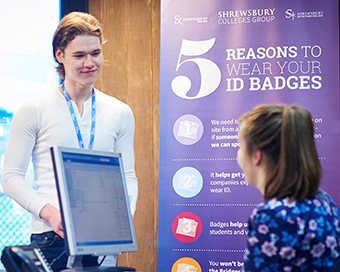Engineering Operative (Level 2 Standard)
| Mode of study | Apprenticeship |
| Duration | 12 Months |
| Campus | London Road Campus |
| Start date | 1 August 2022 |
| Course code | PLR2UPE (APPO) |
-
Who is it for?
Engineering Operatives are predominantly involved in engineering operations which are key to the success of the Manufacturing and Engineering sector allowing employers to grow their business while developing a workforce with the relevant skills and knowledge to enhance and sustain the sector.
The role covers a wide range of common and job-specific skills sets that can be transferred across the manufacturing engineering industry sectors during the course of their careers. Dependent on the sector that they are employed in, there may be subtle differences in terms of composition and application of the job role-specific skills and knowledge they will require, however, the core skills and knowledge will be the same regardless of the sector/area they work in.
Engineering Operatives will have clear reporting lines with anything outside their role and responsibility. They will work individually or as part of a team to carry out a range of engineering operations which could include ensuring machines and equipment used are maintained and serviceable, dealing with breakdowns, restoring components and systems to serviceable condition by repair and replacement; operating a variety of machines (CNC or Conventional); assembling and repairing machine and press tools, dies, jigs, fixtures and other tools; fabrication/installation of a wide variety of other sheet fabrications and equipment and; fabrication and assembly of metal parts joining techniques; preparing materials and equipment for engineering processes, providing technical support including communications software, test tools, performance, capacity planning, and e-commerce technology as required.
Engineering Operatives must comply with statutory regulations and organisation safety requirements including any environmental compliance procedures and systems; Identify hazards and hazardous situations; Prepare the work area and equipment; Obtain and follow the appropriate job documentation and work instructions; Extract the necessary data and information from specifications and related documentation; Carry out the engineering activities in line with their job role; Carry quality checks as required; working with minimum supervision either individually or as part of a team and will be responsible for their own actions and for the quality and accuracy and timely delivery of the work they undertake.
Examples of the occupational roles from across the engineering and manufacturing sector that would be covered within this standard are: Servicing and maintenance operative; Machine setter/operative; Mechanical engineering operative; Fabricator; Engineering fitter; Multi-disciplined engineering operative; Materials, processing and finishing operative, Technical Support operative, founding/casting operative.
-
Entry Requirements
In order to complete this engineering Apprenticeship, you will be expected to complete an initial assessment in Maths and English to ensure you are at a suitable level to work towards this qualification. Ideally, you will have a minimum of grade 3 in both. Some employers will specify their own minimum qualification entry requirements, which would be detailed within their Apprenticeship vacancy.
-
What does the course involve?
For a comprehensive understanding of this engineering programme and what it entails, please click here.
As part of the Engineering Apprenticeship Standard, if you do not hold GCSE Maths and English at grades 9-3, you will also be required to study towards your functional skills Level 2.
-
How is the course assessed?
This engineering Apprenticeship is taught at our London Road Campus on a day release basis once a week. If you need to complete your functional skills, then this will be covered at college in a block week release. In addition, you will be visited at your workplace regularly by your assessor for the duration of your apprenticeship to assess you in the workplace and review progress with your employer. You will be required to sit an End Point Assessment, towards the final stages of your programme, to ensure you have obtained the skills, knowledge and behaviours required to do the job effectively.
-
Additional Notes
Typically, this Engineering Apprenticeship will take 12 months to complete.
-
What do I do next?
To be an apprentice in engineering you will need an employer who can offer you work and release you for your training. Once you have an employer in place, you can apply online. If after reading this fact sheet, you are still undecided about the course most suitable for you, please drop in to one of our Advice Events, ring the Apprenticeship Team on 01743 260400 or email: This email address is being protected from spambots. You need JavaScript enabled to view it.

Gemma Elliot
Foundation Degree in Electrical and Electronics Technology
Previous Institution: Llanfyllin High School
My Foundation Degree is funded by the engineering firm James Fisher. I’m learning so much and absolutely loving it.

Austin Luzadas
Level 3 in Engineering
Previous school: Holy Trinity School, Telford
Level 2 was mostly practical and this year on Level 3 there is a lot of theory and it's preparing me for university. I live outside of Shrewsbury and the transport links to the College are good.

Owen Mason
Level 3 Extended Diploma in Engineering
Previous school: Church Stretton School
I came here because I'm interested in Engineering. I really enjoyed doing my final project and having the creativity to come up with my own design and I have also enjoyed working with hydraulics. I achieved D*D*D* in my Diploma and am now going on to do an Apprenticeship. The teachers are helpful and the equipment at the College is state-of-the-art.

Samantha Pitchford
Level 2 Fabrication and Welding
Previous school: Charlton School
I’m a practical person, so I wanted to do something with my hands. I didn’t have any experience before, but the teachers were really good at guiding me through. I’m a bit of a perfectionist, so the fact that the staff let me work to my own pace really helped. I have now secured an Apprenticeship with Caterpillar in Shrewsbury, and I can see myself being there for some time. I’m sure it wouldn’t have happened unless I’d been on this course as at my interview they seemed really impressed with what I was doing.
Career Options
Are you an employer?
See how an apprentice can help your business.








